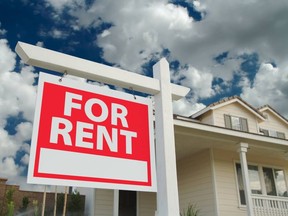Will your investment property actually make money?
The monthly cash flow from your rental property is important, but it’s not everything

Article content
Becoming a real estate investor in Canada may seem like a surefire shortcut to wealth.
Advertisement
This advertisement has not loaded yet, but your article continues below.
Article content
Though it has been for many, few people become successful real estate investors simply by buying whatever properties they can afford and assuming the rent will do all the heavy lifting.
A recent analysis found that, from January 2020 to May 2021, nearly all Toronto homes purchased would lose money for their owners in the rental market. Research has shown that Montreal property investors often lose money on a monthly basis .
Article content
Choosing the right property to invest in requires careful consideration. You need to examine the surrounding neighbourhood to understand the appeal it offers residents, take a look at the local economy to ensure it’s supportive of long-term housing demand and evaluate the property itself in terms of rentability.
Advertisement
This advertisement has not loaded yet, but your article continues below.
Article content
And one of the most important steps is calculating cash flow, the amount of money the property will either earn or lose every month.
If it’s your first time encountering the term “cash flow,” don’t sweat it. Calculating it is fairly easy.
Monthly income isn’t everything
Though ideal, positive cash flow isn’t necessary for a property investment to ultimately be considered successful. A negative cash-flowing home can still be a winner in the long run — if it appreciates in value over time, as has generally been the case with real estate in Canada, and if you can afford the monthly cost.
Article content
“Most people, and especially beginner investors, believe that successful investing is all about cash flow, and that there’s really nothing else that matters. But the real winnings in real estate come from having a long-term view,” says Tom Karadza of Rock Star Real Estate in Oakville, Ont.
Advertisement
This advertisement has not loaded yet, but your article continues below.
Article content
Either way, determining what a property will earn (or cost) you every month is critical in helping you understand whether an investment property fits your budget or your overall investing plan.
The cash-flow formula
The first thing to do is determine the property’s gross income. Based on the home’s condition and local rent values, how much will you realistically be bringing in from rental income every month?
Article content
Once you’ve got that number, it’s time to add up your monthly expenses and subtract them from the gross income. Taxes, maintenance fees and property management costs all need to be included here, as do utilities if your tenants won’t be paying them.
This part of the equation can be tricky for inexperienced investors, who may not know what to pencil in for maintenance and management.
Advertisement
This advertisement has not loaded yet, but your article continues below.
Article content
Monika Jazyk, an Ontario-based real estate investor and founder of Real Property Investments, says she typically subtracts five per cent of the monthly rental amount for maintenance, and eight per cent for property management. If you’re not using a professional property management company, you can ignore this expense.
Jazyk says investors also need to factor in the cost of vacancies. She suggests basing this figure on your local market’s vacancy rate and subtracting that amount from your gross income. So if your local market has a five per cent vacancy rate, you would subtract five per cent from gross income.
“There are times when it could be zero because there’s such a demand for housing, but you will have times during your hold period when tenants leave, so you should always just put that number in there anyways,” she says. “I always do three per cent.”
Advertisement
This advertisement has not loaded yet, but your article continues below.
Article content
Finally, subtract your monthly mortgage payments from your gross income. What’s left over will give you a clear idea of what your monthly cash flow will be.
An example
Let’s run the numbers on a single-family home in Toronto that’s been assessed at $1 million. The tenants are paying all utilities and you’ll be managing the property yourself, so no need to factor in those costs.
- Monthly rental income: $4,000
- Monthly expenses: $509 (taxes), $200 (maintenance), $120 (vacancy)
- Mortgage cost: $3,501 ($800,000 principal, 25-year amortization, five-year fixed rate of 2.29 per cent)
This particular property would be cash-flow negative by $330. For Toronto, circa now, that’s not bad.
If it’s not good enough, improving a property’s cash flow is possible. Working with your mortgage broker to get a lower interest rate will make a difference, as will adding a second rental unit, renting out space in the garage or even putting billboards up on your property, if those are options.
But you won’t be able to find solutions to your cash flow problems until you know how to correctly identify them. Make sure you know how much you’re making or losing every month.
This article provides information only and should not be construed as advice. It is provided without warranty of any kind.
